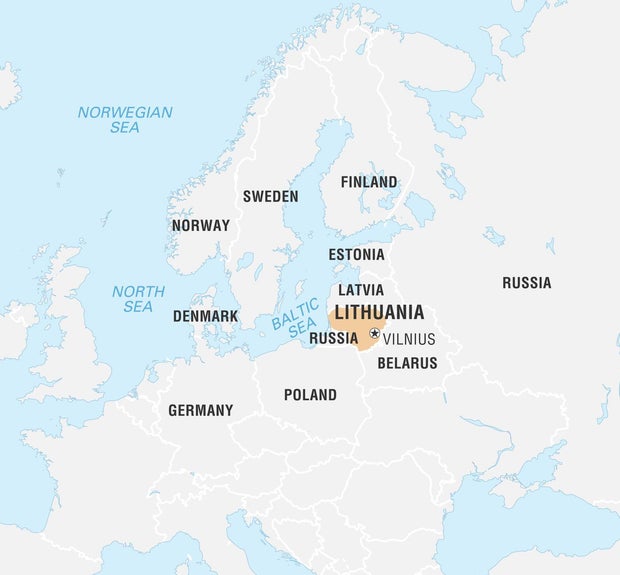The government of Lithuania, which is a member of the U.S.-led NATO alliance, said Monday that it will start shooting down unidentified balloons that enter the country’s airspace, after a number of them allegedly launched from neighboring Belarus forced the repeated closure of a major airport.
Prime Minister Inga Ruginiene warned Monday that any further balloons detected would be shot down after operations at Vilnius International Airport, which serves the capital city, were halted a total of four times last week.
“Today we have decided to take the strictest measures, there is no other way,” Ruginiene told journalists, according to Lithuanian public broadcaster LRT, calling the incidents “hybrid attacks” and saying her country could discuss invoking the collective defense clause in the founding NATO treaty over the incidents.
Article 4 can be invoked by any NATO member that feels its security is at risk, which would spark talks among the allies to discuss the threat. Article 4 has been invoked nine times in NATO’s history, three of which related to Russia’s invasion of Ukraine.
Lithuania believes smugglers use the balloons to transport contraband cigarettes over the border, but it has criticized Belorussian President Alexander Lukashenko, a close ally of Russia’s Vladimir Putin, for not clamping down.
State Border Guard Service via AP
“Inaction is also an action,” Ruginiene said after a meeting of her country’s National Security Commission on Monday. “If Belarus does nothing about it and does not fight, we also assess these actions accordingly.”
Ruginiene added that her government would indefinitely close its land border with Belarus, apart from for diplomats and returning European Union nationals, according to LRT.
“This is how we send a signal to Belarus and say that no hybrid attack will be tolerated here, we will take all the strictest measures to stop such attacks,” she said.
“Our response will determine how far autocrats dare to go,” Ruginiene’s office said in a statement sent later Monday to CBS News.
There was no immediate comment on the incident from officials in Belarus.
“Calculated provocations”
Many of America’s European allies have had their airspace breached in recent weeks, mostly by unclaimed drones sighted around airports and military facilities in Germany, Denmark and the Baltic states. Estonia also accused Russian fighter jets of flying through its airspace for 12 minutes in mid-September.
Lithuania’s Foreign Minister Kestutis Budrys said Monday in a post on social media that NATO was facing a “deliberate escalation of hybrid warfare from Russia and its proxy, Belarus,” calling the spate of recent airspace incursions, “calculated provocations designed to destabilize, distract and test NATO’s resolve.”
He called for further sanctions against Belarus and stronger NATO security measures to deter the airspace violations.
On October 23, a Russian Sukhoi SU-30 fighter and an IL-78 tanker plane flew just under half of a mile into Lithuanian territory, according to the country’s ministry of foreign affairs, after departing from the Russian enclave of Kaliningrad. The Baltic Sea coastal territory is separate from the rest of Russia, and bordered on two sides by Lithuania and Poland.
Encyclopaedia Britannica/Universal Images Group via Getty Images
Two days before that, several “meteorological balloons” launched from Belarus were detected by Lithuanian radar systems in the country’s airspace, disrupting travel at Vilnius’ airport, the foreign ministry said.
Lithuania summoned the top Belorussian diplomat in the country on October 22 to voice a “strong protest regarding the repeated and increasingly frequent violations” of its airspace, warning the Russian ally that Vilnius “reserves the right to take appropriate retaliatory measures.”
Lithuania’s National Crisis Management Center said earlier this month that at least 544 balloons had already entered Lithuanian airspace this year, according to CBS News’ partner network BBC News. The center said 966 such balloon incursions were recorded during 2024.
“Last year we were blind chickens and didn’t see many things,” Ruginiene said Monday. “Thank God, there was no catastrophe. We didn’t see certain moving objects, so there were no decisions to close the airspace.”
“Today we have much better equipment, we can see much more information,” she said, according to LRT. “We believe that we need to take action to protect our citizens.”

